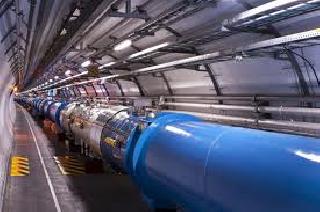
WASHINGTON (PTI): Planetary scientists claim that their new research would for the first time help astronomers accurately measure neutrinos -- the lightest known subatomic particles in the universe.
After more than 200 nights of galaxy-gazing and thousands of calculations, an international team has published their new study that they claim has made a remarkable headway in the way the mass of neutrinos are measured.
The study, published in the 'Physical Review D Rapid Communication', concludes cosmological galaxy measurements are more effective than laboratory experiments on Earth when it comes to constraining neutrino mass for measurement.
Neutrinos are the subatomic-sized fundamental particles floating in the universe and the lightest massive known particles, yet they are traditionally treated as not having any mass.
Lead author Dr Signe Riemer-Sorensen at the University of Queensland said their study would allow researchers to gain a more accurate and highly sensitive picture of neutrino mass, and this could lead to new understandings of the universe.
"This research paves the way for more sensitive future galaxy surveys to understand the mysterious workings of the Universe, and will help in new advancements such as improved models of supernova explosions and in designing neutrino telescopes that can probe much more distant objects than classical telescopes," said Dr Riemer-Sorensen.
Although laboratory experiments on Earth so far have been able to measure the differences in the masses between the various species of neutrinos, these have been unsuccessful in measuring absolute neutrino mass with sufficient sensitivity.
Using the universe as a large particle physics experiment, the team attempted to limit the range of possible neutrino masses by understanding how galaxies form.
"One of the major challenges is that galaxy formation is not well-described theoretically. We have tested a range of previously used theories and demonstrated that most of them are not precise enough to use with present and upcoming galaxy surveys with the much-desired higher level of sensitivity to the neutrino mass," Dr Riemer-Sorensen said.
Using high-quality data from the team's WiggleZ Dark Energy Survey - a massive three-dimensional galaxy map of 240,000 galaxies - the researchers in this study applied a mixture of analytical modelling and simulation to achieve their results.
"Despite the modelling challenges, cosmology does a much better job than laboratory experiments when it comes to constraining the neutrino mass," said Dr Riemer-Sorensen.
 Previous Article
Previous Article Next Article
Next Article











The Indian Air Force, in its flight trials evaluation report submitted before the Defence Ministry l..
view articleAn insight into the Medium Multi-Role Combat Aircraft competition...
view articleSky enthusiasts can now spot the International Space Station (ISS) commanded by Indian-American astr..
view article